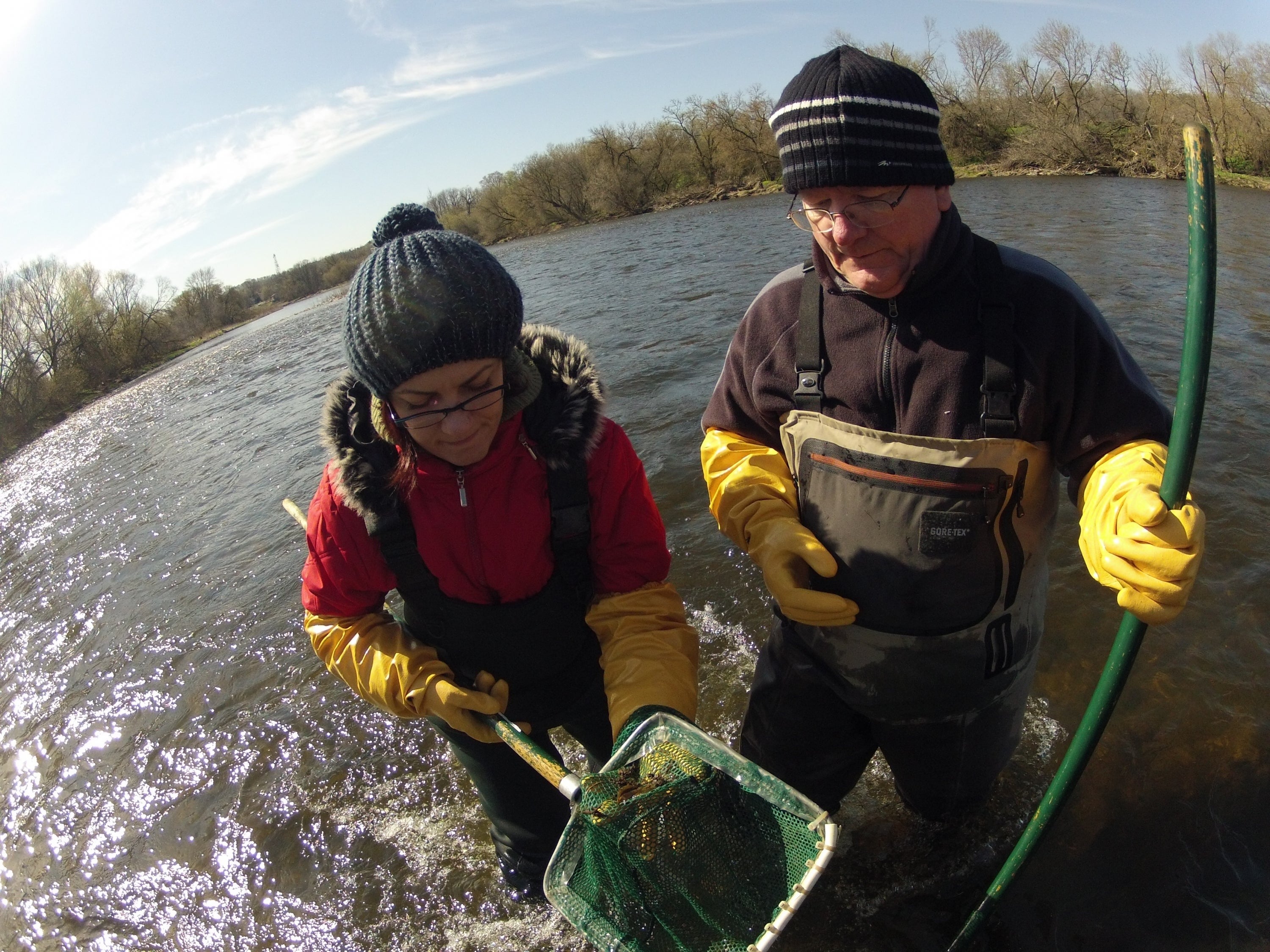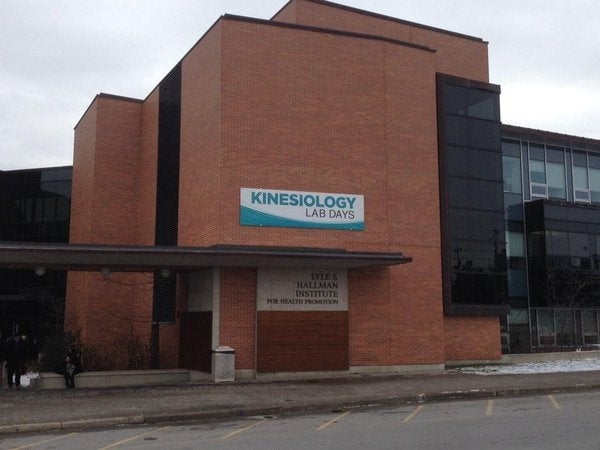Editor:
Brandon Sweet
University Communications
bulletin@uwaterloo.ca
Fishing for answers to pollution-based problems

PhD Candidate Patricija Marjan and Biology Professor Mark Servos collecting rainbow darter fish on the Grand River.
by Victoria Van Cappellen
Biology Professor Mark Servos’ research into the Grand River rainbow darter revealed the males once exhibited one of the world's highest incidence of intersex changes, with early stage eggs found in male testes.
His findings were highlighted this month in the Globe and Mail’s series Headwaters: The future of our most critical resource as part of the ongoing international effort to clean up the Great Lakes’ watershed.
Like “canaries in the coal mine”, male rainbow darters turn out to be extremely sensitive to estrogen and other contaminants being released into aquatic environments from municipal wastewater treatment plants. Servos' and his research group demonstrated that when Waterloo Region upgraded their Kitchener Wastewater Treatment Plant two years ago, the intersex occurrence declined dramatically. The investment by the local municipality is already showing signs of improving the conditions in the river.
Although we are making progress, Servos said in the article, he cautioned that we cannot become complacent when it comes to the health of the Great Lakes watershed.
There is no doubt that we have made progress in water management; things are way better than they were 30 years ago,” said Servos, Canada Research Chair in water-quality protection. “But the consequences of not continuing to be vigilant and prioritizing water protection will be negative impacts on the health and prosperity of our communities.”
The importance of the Great Lakes cannot be underestimated. It’s the largest freshwater system on the planet; it provides drinking water to 44 million people; it’s home to a $7 billion fishing industry; and it serves as the shipping mega-highway from the continental Midwest to the St. Lawrence and the Atlantic.
Thirty years ago the health of the Great Lakes suffered serious setbacks from algal blooms and elevated concentrations of pollutants such as polychlorinated bipbenyl and dioxins.
But now it faces a new series of threats ranging from continually increasing concentrations of nutrients (e.g., phosphorus and nitrogen), warming of lake waters, and the ubiquitous appearance of pharmaceuticals, microplastics and nano-particles in waterways and beaches.
Servos is a member of the Water Institute. Also pictured in the story were Servos's graduate students Meghan Fuzzen, Keegan Hicks and Maricor Arlos, all PhD candidates within the Department of Biology.
The web and the trivia buff's lament
People are less willing to rely on their knowledge and say they know something when they have access to the Internet, suggesting that our connection to the web is affecting how we think.
Professor Evan F. Risko, of the Department of Psychology, led a recent study where the team asked about 100 participants a series of general-knowledge questions, such as naming the capital of France. Participants indicated if they knew the answer or not. For half of the study, participants had access to the Internet. They had to look up the answer when they responded that they did not know the answer. In the other half of the study, participants did not have access to the Internet.
The team found that the people who had access to the web were about 5 per cent more likely to say that they did not know the answer to the question. Furthermore, in some contexts, the people with access to the Internet reported feeling as though they knew less compared to the people without access.
“With the ubiquity of the Internet, we are almost constantly connected to large amounts of information. And when that data is within reach, people seem less likely to rely on their own knowledge,” said Professor Risko, Canada Research Chair in Embodied and Embedded Cognition.
In interpreting the results, the researchers speculated that access to the Internet might make it less acceptable to say you know something but are incorrect. It is also possible that participants were more likely to say they didn’t know an answer when they had access to the web because online searching offers an opportunity to confirm their answer or resolve their curiosity, and the process of finding out is rewarding.
“Our results suggest that access to the Internet affects the decisions we make about what we know and don’t know,” said Risko. "We hope this research contributes to our growing understanding of how easy access to massive amounts of information can influence our thinking and behaviour."
David McLean and Amanda Ferguson, research assistants, are co-authors of the study, which appears in the journal, Consciousness and Cognition. Professor Risko plans to further the research in this area by investigating the factors that lead to individuals' reduced willingness to respond when they have access to the web.
New retirees and other notes
Human Resources is reporting that the following staff members retired as of December 1, 2015:
- Mary Flatt, who started at the University in December 2004, retires as Administrative Co-ordinator (CASF) in Statistics and Actuarial Science; and
- Michael Foulger, who began working at Waterloo in May 1998, retires as Lab Instructor/Electronic Service Technologist in Electrical and Computer Engineering.
In addition, the following faculty members will retire effective January 1, 2016:
- David Taylor, who started at the University in September 1977 and received tenure in July 1986, retires as Professor in the School of Computer Science;
- Paul Guild, who began working at Waterloo in November 1990, retires as Professor in Management Sciences;
- Johnny Wong, who began his career at the University in September 1975 and received tenure in July 1981, retires as Professor in the School of Computer Science;
- Anita Myers, who started at Waterloo in September 1981, retires as Professor in the School of Public Health and Health Systems;
- Ann Plotkin, who joined the University in September 1984, retires as Clinical Professor in the School of Optometry and Vision Science; and
- Leo Rothenburg, who started work at the University in August 1983 and received tenure in July 1987, retires as Professor in Civil and Environmental Engineering;
The following staff members will retire effective January 1, 2016:
- Brian Forler, who started at the University in December 1987, retires as Service/Surplus Co-ordinator in Central Stores;
- Robert Ingleton, who joined Waterloo in August 1985, retires as Research Technician in Earth and Environmental Sciences;
- Anne Weber, who began working at the University in August 1976, retires as Laboratory Demonstrator in the School of Optometry and Vision Science;
- Anne Unger, who started at Waterloo in November 1982, retires as Library Assistant: Book Orders, Acquisitions in the Library;
- Thomas Galloway, who started working at the University in October 1988, retires as Director, Custodial , Grounds and Parking Services in Plant Operations;
- Marianne Rapp, who joined Waterloo in September 2005, retires as Food Services Assistant in Food Services;
- Richard Nicholson, who started at the University in February 1988, retires as Equipment Operator in Plant Operations;
- Dianne Foreman, who began her career at the University in May 1978, retires as Support Staff, ECEC in Psychology;
- Dennis Hahn, who joined Waterloo in September 1988, retires as Maintenance Supervisor in Plant Operations;
- Barb Rae-Schneider, who started at the University in August 1974, retires as Administrative Officer in the School of Pharmacy;
- Beverly Hubbard, who started at Waterloo in September 1990, retires as Library Clerk: Item Preservation in the Library;
- William Ince, whose start date was August 1979, retires as Associate Director, CSCF in the School of Computer Science;
- Christine Jewell, who joined the University in July 1989, retires as Liaison Librarian in the Library;
- William Charles Woods, who started at Waterloo in July 1980, retires as Systems Administrator and Analyst in the Library;
- Elizabeth Breen, who joined Waterloo in November 1990, retires as Maintenance Co-ordinator in Residence Facilities; and
- Jacek Szubra, who started at the University in April 1985, retires as Manager – Science Technical Services.
Congratulations all!

In other news, the Kinesiology Lab Days continue this week from December 14 to December 16. High school students will be attending sessions on assessing, treating, and preventing movement-related illness and injury.
The Registrar's office has published the 2016-2017 Important Dates on the Quest website. The chart will be updated as the dates marked "to be determined" are established.
Science Undergraduate Office closed at lunch Wednesday
The Science Undergrad Office in ESC 253 will be closed Wednesday, December 16, from 11:45 a.m. to 2:15 p.m.
"We apologize for any inconvenience this may cause," says a note from the Science office. "Check the Science current undergraduate students page for our regular hours."
Finance-Student Accounts Office Closed at lunch Thursday
The Finance – Student Accounts office NH1110 will be closed on Thursday, December 17 from 11:45 a.m. to 2:00 p.m. for a staff event.
Link of the day
Feeling flames on the side of your face? It's Clue's 30th anniversary
When and where
Kinesiology Lab Days, Monday, December 14 to Wednesday, December 16.
Waterloo This-Idea-Must-Die Day, Monday, December 14, 1:00 p.m., AL 208.
CTE601: Instructional Skills Workshop, Tuesday, December 15 to Thursday, December 17, EV1 241.
Retirement celebration for Jenny MacIntyre, Tuesday, December 15, 2:00 p.m., MKV multipurpose room.
MBET Webinar, Tuesday, December 15, 5:00 p.m.
UWRC Book Club event featuring Dennis Maione's "What I Learned From Cancer," Wednesday, December 16, 12:00 p.m., LIB 407.
Advent Jazz Vesper Service, Wednesday, December 16, 7:00 p.m., Conrad Grebel University Chapel.
Retirement reception for Bob Gillham, Thursday, December 17, 4:00 p.m., EIT Atrium. RSVP to Mary Anne Hardy, ext. 32658 or mahardy@uwaterloo.ca.
Calgary Alumni Chapter Thirsty Third Thursday, Thursday, December 17, 5:00 p.m., The Last Best Brewing & Distilling, Calgary AB.
Co-operative Work Term ends, Friday, December 18.
Fine Arts presents MOTUS: A collaborative sensory performance, Saturday, December 19, 2:00 p.m., Button Factory.
On-Campus Examinations end, Tuesday, December 22.
Christmas holidays, Thursday December 24 to Thursday, December 31, most University services and buildings closed.
New Year's Day, Friday, January 1, 2016, most University services and buildings closed.
Winter Orientation Week, Sunday, January 3 to Friday, January 8, 2016.
Co-operative work term begins, Monday, January 4, 2016.
Winter 2016 lectures begin, Monday, January 4, 2016.
Knowledge Integration Seminar: Researching between, across, without disciplinary borders: my experience with transdisciplinarity, Friday, January 8, 2016, 2:30 p.m., AL 113.
CTE656: Getting Started in LEARN, Tuesday, January 12, 2016, 1:00 to 3:00 p.m., EV1 241.
CTE759: Designing Teaching and Learning Research, Wednesday, January 13, 2016, 11:30 a.m. to 1:30 p.m., Dana Porter Library.
CTE550: LEARN for TAs, Thursday, January 14, 2016, 2:00 to 4:00 p.m., EV1 241.
Course add period ends, January 15, 2016.
UW Collaborates: A Crash Course in Collaboration, Saturday, January 16, 8:00 a.m., Environment 3.
CTE760: Enhancing Group Work, Sunday, January 17, 2016, 10:30 a.m. to 2:30 p.m., EV2 2069.
Upper Year Information Session for CS students, Monday, January 18, 2016, 3:30 p.m., DC 1304.
University Senate Meeting, Monday, January 18, 2016, 3:30 p.m., NH 3407.
CTE727: Using LEARN’s Rubric Feature, Tuesday, January 19, 2016, 10:00 to 11:30 a.m., EV1 241.
Biomaterial & Biomanufacturing Academic-Industry Forum, Tuesday, January 19, 2016, 2:30 p.m., QNC 1501.
Drop, No Penalty Period ends, Thursday, January 22, 2016.
Water Institute WaterTalk Lecture by Sharad Lele, Thursday, January 28, 2:30 p.m., DC 1302.
Knowledge Integration Seminar: KI alumni panel "Life after KI", Friday, January 29, 2:30 p.m., AL 113.
Retirement reception for David Taylor, Friday, January 29, 3:30 p.m., University Club.